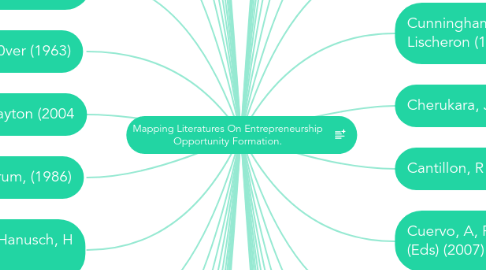Mapping Literatures On Entrepreneurship Opportunity Formation.
par Kingsley Njoku


1. Ardichvili, A, Cardozo, R, and Ray, S (2003)
1.1. A theory of entrepreneurial opportunity identification and development
2. Aldrich, H (1989)
2.1. From traits to rates: An ecological perspective on organizational foundings
3. Alvarez, S A and Busenitz, L W (2001)
3.1. The entrepreneurship of resource-based theory
4. Alvarez, S A, Barney, J B, and Young, S L (2010)
4.1. Debates in Entrepreneurship: Opportunity Formation and Implications for the Field of Entrepreneurship
5. Baumol, W (1990)
5.1. Entrepreneurship: productive, unproductive, and destructive. Journal of Political Economy
6. Barreto, L (2012)
6.1. Solving the Entrepreneurial Puzzle: The Role of Entrepreneurial Interpretation in Opportunity Formation and Related Process
7. Bygrave, W (2006)
7.1. The entrepreneurship paradigm,
8. Busenitz, L and Barney, J (1997)
8.1. Differences between entrepreneurs and managers in large organizations
9. Davidsson, P, Low, M B and Wright, M (2001)
9.1. Achievements and future directions for entrepreneurship research. Entrepreneurship Theory and Practice
9.2. 32. Eckhardt, J T and Shane, S A (2003)
10. Dunkelberg, W C and Cooper, A C (1982)
10.1. Entrepreneurial typologies
11. De Ro0ver (1963)
11.1. A Conceptual history of entrepreneurial thought
12. Drayton (2004
12.1. A Conceptual history of entrepreneurial thought.
13. Executive Forum, (1986)
13.1. Entrepreneurship: Past research and future challenges
14. Grebel, T, Pyka, A and Hanusch, H (2001)
14.1. An Evolutionary Approach to the Theory of Entrepreneurship
15. Gnywali, D R and Fogel, D S (1994)
15.1. Environments for entrepreneurship development: key dimensions and research implications
16. Gartner, W B (1988)
16.1. Who Is an Entrepreneur? Is the Wrong Question?
17. Gartner, W B (1995)
17.1. Aspects of organizational emergence
18. Hebert, R F and Link, A N (2009)
18.1. A History of Entrepreneurship
19. Hansen, D J, Shrader, R, Monllor, J (2011)
19.1. Defragmenting Definitions of Entrepreneurial Opportunity
20. Hornaday, J A and Aboud, J (1971)
20.1. Characteristics of successful entrepreneurs: Personnel Psychology
21. Iversen, J el at., (2008)
21.1. Defining and Measuring Entrepreneurship
22. Korsgaad, S (2011)
22.1. Opportunity Formation In Social Entrepreneurship
23. Klein and Cook (2006)
23.1. Evolution of Entrepreneurship theories through different schools of thought
24. Landstrom, H, Harirchi, G, and Astrom, F (2012)
24.1. Entrepreneurship: Exploring the knowledge base.
25. Agassi, J (1963
25.1. Towards an Historiography of Science, History and Theory
26. Brockhaus, R H (Sr) (1980)
26.1. Risk taking propensity of entrepreneurs
27. Bygrave, W D (2004)
27.1. The entrepreneurial process
28. Brockhaus, R H (Sr) and Horwitz, P S (1986)
28.1. The psychology of the entrepreneur
29. Bhave, M (1994)
29.1. A process model of entrepreneurial venture creation
30. Belidor, B F (New Edition (Navier, M (1813)
30.1. La Science Des Ingenieurs
31. Berglund, K, Dahlin, M, Johansson, A W (2007)
31.1. Walking a tightrope between artistry and entrepreneurship
32. Brush, C G, Manolova, T S and Edelman, L F (2008)
32.1. Separated by Common Language? Entrepreneurship Research Across the Atlantic
33. Baron, R A (2006)
33.1. Opportunity Recognition as Pattern Recognition: How Entrepreneurs “Connect the Dots” to Identify New Business Opportunities
34. Cooney, T M (2005)
34.1. Editorial: What is an Entrepreneurial Team?
35. Cunningham, J. Barton and Joe Lischeron (1991)
35.1. Defining Entrepreneurship. Available from Journal of Small Business
36. Cherukara, J M and Manalel, J (2011)
36.1. Evolution of Entrepreneurship theories through different schools of thought: Conference Paper
37. Cantillon, R (1959)
37.1. Essai sur la nature de Commerce in General (Essay on the Nature of Trade in General)
38. Cuervo, A, Ribeiro, D and Roig, Salvador (Eds) (2007)
38.1. Entrepreneurship: Concepts, Theory and Perspective
39. Casson, M (2nd EDN) (2003)
39.1. The Entrepreneur: An Economic Theory
40. Cole, A H (1968)
40.1. Entrepreneurship: Past research and future challenges
41. Drucker, P F (1985)
41.1. Innovation and Entrepreneurship
42. Dubin (1978)
42.1. What Constitutes a Theoretical Contribution?
43. Eckhardt, J T and Shane, S A (2003)
43.1. Opportunity and entrepreneurship.
44. Gartner, W B (1990)
44.1. What are we talking about when we talk about entrepreneurship?
45. Gartner, W B (1985b)
45.1. Entrepreneurs and entrepreneurship: process versus content approaches
46. Hills, G E (1994)
46.1. Marketing and Entrepreneurship: Research Ideas and Opportunities
47. Kirzner, I M (1973)
47.1. Competition and Entrepreneurship.
47.2. Kirzner, I M (1985
47.2.1. Discovery and the Capitalist Process
